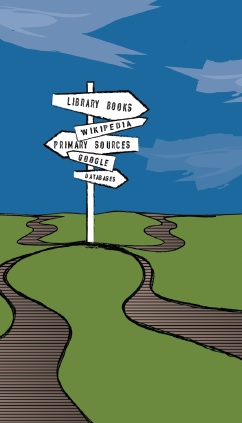
 The Framework for Information Literacy is a guiding document for librarians and academics interested in information literacy. It is based on the pedagogical theory of threshold concepts, defined as those ideas in any discipline that are passageways or portals to enlarged understanding or ways of thinking and practicing within that discipline.
The Framework for Information Literacy is a guiding document for librarians and academics interested in information literacy. It is based on the pedagogical theory of threshold concepts, defined as those ideas in any discipline that are passageways or portals to enlarged understanding or ways of thinking and practicing within that discipline.
The Framework is organized into six frames, each consisting of a concept central to information literacy, a set of knowledge practices and a set of dispositions.
Knowledge practices are demonstrations of ways in which learners can increase their understanding of information literacy concepts, while dispositions describe ways in which to address the affective, attitudinal, or valuing dimension of learning.
Framework for Information Literacy for Higher Education - ACRL (Association of College and Research Libraries), 2015
Information Literacy Competency Standards for Higher Education
Association of College and Research Libraries, 2000.
Information resources reflect their creators’ expertise and credibility, and are evaluated based on the information need and the context in which the information will be used. Authority is constructed in that various communities may recognize different types of authority. It is contextual in that the information need may help to determine the level of authority required.
Information in any format is produced to convey a message and is shared via a selected delivery method. The iterative processes of researching, creating, revising, and disseminating information vary, and the resulting product reflects these differences.
Information possesses several dimensions of value, including as a commodity, as a means of education, as a means to influence, and as a means of negotiating and understanding the world. Legal and socioeconomic interests influence information production and dissemination.
Research is iterative and depends upon asking increasingly complex or new questions whose answers in turn develop additional questions or lines of inquiry in any field.
Communities of scholars, researchers, or professionals engage in sustained discourse with new insights and discoveries occurring over time as a result of varied perspectives and interpretations.
Searching for information is often nonlinear and iterative, requiring the evaluation of a range of information sources and the mental flexibility to pursue alternate avenues as new understanding develops.
Denison Libraries, 100 W College, Granville, Ohio 43023 Phone: 740-587-6235, email: reference@denison.edu In order to view PDF documents, you will need to have the free Adobe Acrobat Reader software installed on your computer